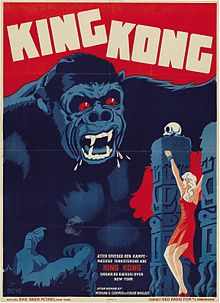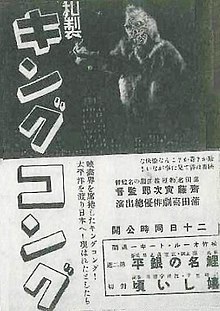King Kong
fictional character, a giant ape monster.
King Kong is a fictional monster resembling a gorilla that has appeared in several films since 1933.


Quotes about Kong
edit- All three "King Kongs"--the classic 1933 version starring Fay Wray, the campy 1976 version starring Jessica Lange and the current epic by "Lord of the Rings" director Peter Jackson--feature a big, black ape who falls in love with a willowy white woman. The unspoken fear about black-white sexual relations has been remarked on by film historians and cultural critics ever since. The 1933 original stoked anxieties about black male hypersexuality. Kong snatches Ann Darrow up and makes off with her as she screams in horror.
And the film's supposedly African natives--who offer the heroine up to the giant ape--came from what some critics called the ooga-booga(ph) school of thespian arts. Newsday columnist Jim Pinkerton says the 2005 "Kong", starring a dewy, blond Naomi Watts, shows the story line hasn't evolved all that much.
- Karen Grisby Bates, "Race and 'King Kong'", NPR, (December 22, 2005).
- Intellectuals have attempted to read certain symbolisms into King Kong. Kong represents a Depression-stricken people lashing out against society; Kong is a Christ figure crucified on a stage before an audience of spectators; Kong symbolizes the black man and his conflict against his white oppressors; Kong on the Empire State Building depicts the most spectacular phallic symbol ever captured by film; and so on. Cooper has disavowed these "insights" into his film; he was not the kind of person to consider injecting messages into his productions. … Whatever messages might lurk beneath the film's surface were entirely coincidental on Cooper's part or, at best, subliminal.
- Donald F. Glut, in Classic Movie Monsters (1978), p. 314; also quoted in King Kong Cometh! (2005) by Paul A. Woods, p. 67
- The Ymir and Kong before him are both creatures wrenched from their natural environment against their will and finally killed by man. Although these creatures must always die, they should go out with a touch of pathos.
- Ray Harryhausen (2003), An Animated Life, Aurum Press, p. 98
- Remember: KING KONG Died for your Sins.